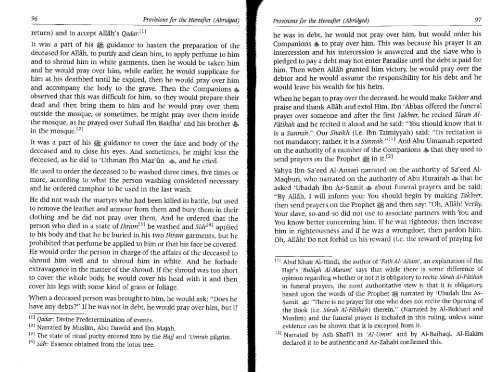Provisions for the Hereafter (Zaad Al-Ma'ad)
Provisions for the Hereafter (Zaad Al-Ma'ad)
Provisions for the Hereafter (Zaad Al-Ma'ad)
Create successful ePaper yourself
Turn your PDF publications into a flip-book with our unique Google optimized e-Paper software.
96 <strong>Provisions</strong> <strong>for</strong> <strong>the</strong> <strong>Hereafter</strong> (Abridged)<br />
return) and to accept <strong>Al</strong>lah's Qadar Ell<br />
It was a part of his1e, guidance to hasten <strong>the</strong> preparation of <strong>the</strong><br />
deceased <strong>for</strong> <strong>Al</strong>lah, to purify and clean him, to apply perfume to him<br />
and to shroud him in white garments, <strong>the</strong>n he would be taken him<br />
and he would pray over him, while earlier, he would supplicate <strong>for</strong><br />
him at his deathbed until he expired, <strong>the</strong>n he would pray over him<br />
and accompany <strong>the</strong> body to <strong>the</strong> grave. Then <strong>the</strong> Companions<br />
observed that this was difficult <strong>for</strong> him, so <strong>the</strong>y would prepare <strong>the</strong>ir<br />
dead and <strong>the</strong>n bring <strong>the</strong>m to him and he would pray over <strong>the</strong>m<br />
outside <strong>the</strong> mosque, or sometimes, he might pray over <strong>the</strong>m inside<br />
<strong>the</strong> mosque, as he prayed over Suhail Ibn Baidha' and his bro<strong>the</strong>r 4<br />
in <strong>the</strong> mosque.E 21<br />
It was a part of his', guidance to cover <strong>the</strong> face and body of <strong>the</strong><br />
deceased and to close his eyes. And sometimes, he might kiss <strong>the</strong><br />
deceased, as he did to 'Uthman Ibn Maz'Un 4, and he cried.<br />
He used to order <strong>the</strong> deceased to be washed three times, five times or<br />
more, according to what <strong>the</strong> person washing considered necessa ry<br />
and he ordered camphor to be used in <strong>the</strong> last wash.<br />
He did not wash <strong>the</strong> martyrs who had been killed in battle, but used<br />
to remove <strong>the</strong> lea<strong>the</strong>r and armour from <strong>the</strong>m and bury <strong>the</strong>m in <strong>the</strong>ir<br />
clothing and he did not pray over <strong>the</strong>m. And he ordered that <strong>the</strong><br />
person who died in a state of Ihram 131 be washed and Sidr141 applied<br />
to his body and that he be buried in his two Ihram garments, but he<br />
prohibited that perfume be applied to him or that his face be covered.<br />
He would order <strong>the</strong> person in charge of <strong>the</strong> affairs of <strong>the</strong> deceased to<br />
shroud him well and to shroud him in white. And he <strong>for</strong>bade<br />
extravagance in <strong>the</strong> matter of <strong>the</strong> shroud. If <strong>the</strong> shroud was too short<br />
to cover <strong>the</strong> whole body, he would cover his head with it and <strong>the</strong>n<br />
cover his legs with some kind of grass or foliage.<br />
When a deceased person was brought to him, he would ask: "Does he<br />
have any debts?" If he was not in debt, he would pray over him, but if<br />
[11 Qadar: Divine Predetermination of events.<br />
[23 Narrated by Muslim, Abu DawQd and Ibn Majah.<br />
" 1 The state of ritual purity entered into by <strong>the</strong> Han and 'Umrah pilgrim.<br />
41 Stdr: Essence obtained from <strong>the</strong> lotus tree.<br />
<strong>Provisions</strong> <strong>for</strong> <strong>the</strong> <strong>Hereafter</strong> (Abridged) 97<br />
he was in debt, he would not pray over him, but would order his<br />
Companions to pray over him. This was because his prayer is an<br />
intercession and his intercession is answered and <strong>the</strong> slave who is<br />
pledged to pay a debt may not enter Paradise until <strong>the</strong> debt is paid <strong>for</strong><br />
him. Then when <strong>Al</strong>lah granted him victory, he would pray over <strong>the</strong><br />
debtor and he would assume <strong>the</strong> responsibility <strong>for</strong> his debt and he<br />
would leave his wealth <strong>for</strong> his heirs.<br />
When he began to pray over <strong>the</strong> deceased, he would make Takbeer and<br />
praise and thank <strong>Al</strong>lah and extol Him. Ibn 'Abbas offered <strong>the</strong> funeral<br />
prayer over someone and after <strong>the</strong> first Takbeer, he recited Sarah <strong>Al</strong>-<br />
Fittihah and he recited it aloud and he said: "You should know that it<br />
is a Sunnah." Our Shaikh (i.e. Ibn Taimiyyah) said: "Its recitation is<br />
not mandatory; ra<strong>the</strong>r, it is a Sunnah." fil And Abu Umamah reported<br />
on <strong>the</strong> authority of a number of <strong>the</strong> Companions 4 that <strong>the</strong>y used to<br />
send prayers on <strong>the</strong> Prophet A in UPI<br />
Yahya Ibn Sa'eed <strong>Al</strong>-Ansari narrated on <strong>the</strong> authority of Sa'eed <strong>Al</strong>-<br />
Maqburi, who narrated on <strong>the</strong> authority of Abu Hurairah 4 that he<br />
asked 'Ubadah Ibn As-Samit 4 about funeral prayers and he said:<br />
"By <strong>Al</strong>lah, I will in<strong>for</strong>m you: You should begin by making Takbeer,<br />
<strong>the</strong>n send prayers on <strong>the</strong> Prophet tt and <strong>the</strong>n say: "Oh, <strong>Al</strong>lah! Verily<br />
Your slave, so-and-so did not use to associate partners with You and<br />
You know better concerning him. If he was righteous, <strong>the</strong>n increase<br />
him in righteousness and if he was a wrongdoer, <strong>the</strong>n pardon him.<br />
Oh, <strong>Al</strong>lah! Do not <strong>for</strong>bid us his reward (i.e. <strong>the</strong> reward of praying <strong>for</strong><br />
" 1 Abul Khair <strong>Al</strong>-Hindi, <strong>the</strong> author of 'Fath , an explanation of Ibn<br />
Hajr's 'Bulagh <strong>Al</strong>-Maram' says that while <strong>the</strong>re is some difference of<br />
opinion regarding whe<strong>the</strong>r or not it is obligatory to recite Sarah <strong>Al</strong>-Filahah<br />
in funeral prayers, <strong>the</strong> most authoritative view is that it is obligatory,<br />
based upon <strong>the</strong> words of <strong>the</strong> Prophet 0, narrated by 'Ubadah Ibn As-<br />
Samit 4: "There is no prayer <strong>for</strong> one who does not recite <strong>the</strong> Opening of<br />
<strong>the</strong> Book (i.e. Sarah <strong>Al</strong>-Fa tihah) <strong>the</strong>rein." (Narrated by <strong>Al</strong>-Bukhari and<br />
Muslim) and <strong>the</strong> funeral prayer is included in this ruling, unless some<br />
evidence can be shown that it is excepted from it.<br />
111 Narrated by Ash-Shafi'i in 'AI-Umm' and by <strong>Al</strong>-Baihaqi. <strong>Al</strong>-Hakim<br />
declared it to be au<strong>the</strong>ntic and Az-Zahabi confirmed this.

















